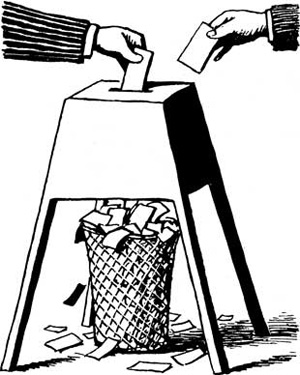
Fair elections are a cornerstone of democracy, and part of what Canada's veterans fought to guarantee in past wars. But here we are, 144 years since Canada became a so-called democracy, and no one can tell whether Elections Canada is enforcing the federal election law fairly and properly.
Democracy Watch's recently completed analysis of Elections Canada's enforcement of the Canada Elections Act since 2004 has revealed that it has failed to report details of how it has investigated and ruled on 2,284 complaints it received about violations of the Act during elections, and likely many other complaints it received in between elections.
Last week, Crown prosecutors, acting on behalf of Elections Canada, cut a deal with the federal Conservatives to end the court case against Conservative senators, party officials and the Conservative Party over the party's advertising spending scheme in the 2006 election. That case is public because charges were filed, and the party pleaded guilty in the deal and paid the maximum fine, while the charges against the senators and officials were dropped.
Failure to enforce, or even ask
Prosecutors should have pursued the case against the senators and officials, as there was a likelihood of conviction given the evidence that they knew what they were doing and knew there were serious issues about whether it could be done legally.
At least the public can form its own opinion about the situation, because what Elections Canada has done in investigating and pursuing the case is public -- but with the 2,284 other complaint situations, no one knows what Elections Canada has done.
Unfortunately, this is not an unusual situation. Because of the failure of MPs to ask key questions, and the failures of the heads of various federal good government watchdog agencies, former federal Integrity Commissioner Christiane Ouimet hid her negligently weak enforcement record from 2007 to 2010, as did federal Commissioner of Lobbying Karen Shepherd from 2007 to spring 2011 (and her predecessor Michael Nelson from 2004 to 2007). And, federal Conflict of Interest and Ethics Commissioner Mary Dawson continues to hide details about her dangerously weak enforcement record, because MPs continue to fail to ask her key questions.
In a letter dated Feb. 16, 2011 sent to the chairs of six House committees and other key Senate, Privy Council and Cabinet officials, seven Officers of Parliament (including Elections Canada's Chief Electoral Officer Marc Mayrand, but not including Ethics Commissioner Dawson) urged House and Senate committees to watch them more closely to ensure they are doing their jobs properly.
However, in recent House committee hearings at which the chief electoral officer, ethics commissioner, and commissioner of lobbying have appeared, MPs have again failed to ask them key questions about how and whether they are doing their jobs properly.
Give us the details
Elections Canada claims that it has resolved many of the 2,284 election complaints, but the public has a right to know the details of when, how and why each complaint was resolved. To date, Elections Canada has disclosed the details of the resolution of only 53 situations since 2004. It has not even disclosed the number of complaints it has received each year in between elections, and there are an additional 1,874 complaints about which only a vague summary has been disclosed.
The details about the 2,284 election complaints and other complaints may reveal that Elections Canada is investigating and ruling on every complaint fairly and effectively, and in a timely way -- or it may reveal that Elections Canada is acting in biased, unfair ways that negatively affect the outcome of elections and/or the reputations of only certain politicians and party officials.
The same is true with the other key democratic, good government watchdog agencies -- if we don't know the details about how they are ruling on each complaint, we can't know if they are acting fairly.
Hopefully, MPs will hold soon hearings and request details so that Elections Canada's actual enforcement record over the past seven years will be revealed for public scrutiny. And hopefully MPs will soon change their past practices, and consistently and regularly hold hearings at which they ask the questions to get the information needed to ensure all the federal good government watchdog agencies are doing their jobs well and properly.
But the real, much-needed solution is to change the laws that regulate all these good government watchdog agencies to require disclosure of this key information that the public has a right to know.
[Tags: Politics, Rights and Justice.] ![]()
Read more: Rights + Justice, Politics















Tyee Commenting Guidelines
Comments that violate guidelines risk being deleted, and violations may result in a temporary or permanent user ban. Maintain the spirit of good conversation to stay in the discussion.
*Please note The Tyee is not a forum for spreading misinformation about COVID-19, denying its existence or minimizing its risk to public health.
Do:
Do not: